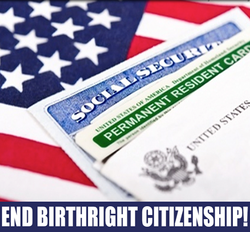
The history of immigrant and naturalized citizenship
An excerpt from ‘Beers with our Founding Fathers’
What is the history of immigrant and naturalized citizenship? The Fourteenth Amendment of 1868 provides, among many things to include civil rights, that any person born in the United States should be a citizen. Although a Supreme Court decision has ruled that a person born in the United States, regardless of parental citizenship or immigration status, is a United States citizen, this is severely abused (see below) and likely not the underlying intent of the decision.
The original Supreme Court decision testing this was based on a case in which the son of legal immigrants to the United States, but later illegitimized by an anti-immigrant law specific to an ethnic group. Under the enforcement of the act, his parents voluntarily returned to their native country and he accompanied them. Upon his return he was denied entry as being a non-citizen; even though he was born to parents lawfully in the United States. In 1898 the Supreme Court ruled that he was a citizen by birth, and would be applicable to any person born in the United States. It is important to note that his parents were legal immigrants, until a law was passed that prejudicially altered the status of an entire ethnic group, their own, illegal. I submit that the intent was not to grant citizenship by birth to those whose parents illegally entered the United States to give birth. This decision was appropriate, but has been hi-jacked.
The status of legal immigrant residence in the United States should not be perpetual, or if warranted should be by test. Part of that test is to not have been a burden on taxpayers, and having been a productive member of society and to have never entered the United States illegally or been born to one or two parents that entered illegally. I agree with granting the right to seek naturalized citizenship to any person having held a valid legal immigrant visa for ten years and would renounce any other citizenship. If a person is born in the United States to one or both parents who are illegally in the United States and wishes to seek naturalized citizenship, they must obtain the same legal status as a legal immigrant, but would be referred to as a legal resident alien. Any person naturalized under a legal resident alien status could not sponsor any person for immigration or citizenship.
******
Learn the answers and history of our Country, Founding Fathers and Founding Documents detailed in the newly published ‘Beers with our Founding Fathers’ – all formats (paperback, Kindle, etc.) are available from http://www.beerswithourfoundingfathers.com/order.html
An excerpt from ‘Beers with our Founding Fathers’
What is the history of immigrant and naturalized citizenship? The Fourteenth Amendment of 1868 provides, among many things to include civil rights, that any person born in the United States should be a citizen. Although a Supreme Court decision has ruled that a person born in the United States, regardless of parental citizenship or immigration status, is a United States citizen, this is severely abused (see below) and likely not the underlying intent of the decision.
The original Supreme Court decision testing this was based on a case in which the son of legal immigrants to the United States, but later illegitimized by an anti-immigrant law specific to an ethnic group. Under the enforcement of the act, his parents voluntarily returned to their native country and he accompanied them. Upon his return he was denied entry as being a non-citizen; even though he was born to parents lawfully in the United States. In 1898 the Supreme Court ruled that he was a citizen by birth, and would be applicable to any person born in the United States. It is important to note that his parents were legal immigrants, until a law was passed that prejudicially altered the status of an entire ethnic group, their own, illegal. I submit that the intent was not to grant citizenship by birth to those whose parents illegally entered the United States to give birth. This decision was appropriate, but has been hi-jacked.
The status of legal immigrant residence in the United States should not be perpetual, or if warranted should be by test. Part of that test is to not have been a burden on taxpayers, and having been a productive member of society and to have never entered the United States illegally or been born to one or two parents that entered illegally. I agree with granting the right to seek naturalized citizenship to any person having held a valid legal immigrant visa for ten years and would renounce any other citizenship. If a person is born in the United States to one or both parents who are illegally in the United States and wishes to seek naturalized citizenship, they must obtain the same legal status as a legal immigrant, but would be referred to as a legal resident alien. Any person naturalized under a legal resident alien status could not sponsor any person for immigration or citizenship.
******
Learn the answers and history of our Country, Founding Fathers and Founding Documents detailed in the newly published ‘Beers with our Founding Fathers’ – all formats (paperback, Kindle, etc.) are available from http://www.beerswithourfoundingfathers.com/order.html
 RSS Feed
RSS Feed